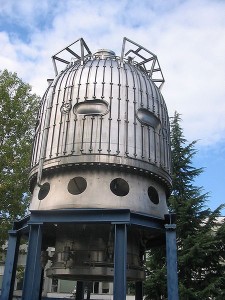Physicists will announce existence of Higgs particle dubbed the Gold particle
Physicists at Fermi National Accelerator Lab said Monday that they have come tantalizingly close to proving the existence of the elusive subatomic Higgs boson – dubbed the “God particle” because it brings mass and order to the universe.
The physicists have begun quietly cheering at CERN, the European particle-physics lab near Geneva in Switzerland. “Without a doubt, we have a discovery,” says one member of the team working on the ATLAS experiment, who wished to remain anonymous. “It is pure elation!”
This 30-year hunt is reaching an end, with experts confident they will soon be able to make a definitive statement about the particle’s existence.
In particle physics, three sigma counts as “evidence”. Claiming a discovery requires a statistical certainty of five sigma – which denotes a one in a million chance that any given result is a fluke.
Physicists have maintained that they will not announce the discovery of the Higgs until the signal surpasses 5 sigma, meaning that it has just a 0.00006% chance of being wrong. The ATLAS and CMS experiments are each seeing signals between 4.5 and 5 sigma, just a whisker away from a solid discovery claim. The results are also consistent with an analysis from the mothballed Tevatron collider, which was presented today at Fermilab in Batavia, Illinois.
CERN’s head of communications, James Gillies, confirmed that four of the theorists who dreamt up the Higgs mechanism in the 1960s — François Englert, Carl Hagen, Peter Higgs and Gerald Guralnik — will be present at Wednesday’s seminar, but he declined to be drawn on what will be announced. “Things are still evolving here,” he says. “Until the spokespersons of the ATLAS and CMS collaborations stand up in front of the audience, it’s premature to speculate.”
Physicists will now turn their attention to understanding the new particle. Crucially, they will want to know whether it behaves like a mass-giving Higgs, and more specifically whether it behaves like the Higgs predicted in the standard model. One important task will be to carefully measure the different ways that the particle is produced and decays inside the LHC detectors. The rates could be altered by the existence of exotic new particles not predicted by the standard model that would interfere with the underlying quantum mechanical behaviour.
“Fine, there is something there — a resonance,” says Martinus Veltman, emeritus professor at the University of Michigan in An Arbor, who shared the 1999 Nobel Prize in Physics for his work on the standard model. “Now we have to find out if it has all the properties that the Higgs is supposed to have.”















